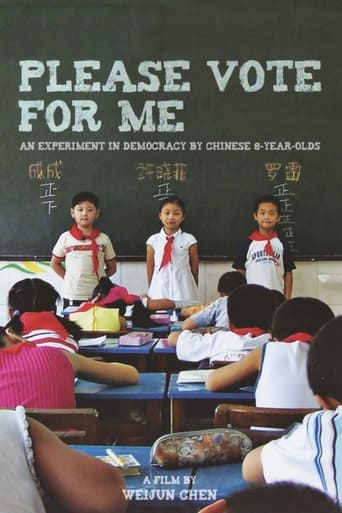

Please Vote for Me (2007)
At Evergreen Primary School in Wuhan, China, a Grade 3 class learns what democracy is when an election for class monitor is being held. Three children are chosen by the teacher as candidates and they have a few days to campaign and convince their classmates to vote for them. The little candidates are seen at school and at home, where their parents do their best to make sure their child will win the election.
Watch Trailer
Cast


Similar titles

Reviews
Best movie ever!
This is a small, humorous movie in some ways, but it has a huge heart. What a nice experience.
There are moments in this movie where the great movie it could've been peek out... They're fleeting, here, but they're worth savoring, and they happen often enough to make it worth your while.
A clunky actioner with a handful of cool moments.
As I was watching Please Vote for Me, a documentary by Weijun Chen, I thought for a few moments that I was watching a modern American reality television show. I was also quite shocked by the actions of the parents of the children in the film. Please Vote for Me is the story of a third-grade class in China getting their first taste of democracy. Three candidates are selected to run for "class monitor," and they all run campaigns to try and win. The duties of the class monitor are never very well specified, but it's evident that they get to boss around the other kids and keep them in line. There were three candidates: Luo Lei, Cheng Cheng and Xu Xiaofei. Luo Lei had an automatic advantage because he had been class monitor before, which is probably why he won in the end. Cheng Cheng was extremely bossy, and Xu Xiaofei was very sensitive and the only girl in the race. The thing that shocked me the most in this film was what the parents did to help their children win. It was similar to a modern election, full of scandal and bribery. It was just a bit less discreet. The kids were taken on a trip, given gifts, and promised a lot of things. Truthfully, the race seemed more like a pageant to me. There was a talent portion and a speech and then a debate, which was the one thing that really made it a political race. In the speeches, it was less about telling what they were going to do, it was more about the flaws of the other person. The candidates even asked their classmates for flaws of their opponents. It was really shocking how mean kids are to each other. I liked how it was shot though, very relaxed, very real. It made me feel like I was actually taking part in the action. I also liked that the cameras went home with the kids (even though it wasn't that great how Cheng Cheng was in his underwear all the time), it really gave a feel for how much the parents were involved. They wrote the speeches, told them exactly was to do, and provided bribes for the kids to use. It was wrong, but it made it much more interesting. This film was captivating and well made. I enjoyed it a lot, but it seemed like the translators didn't subtitle as much as they could. I don't know if this is true, but It could have definitely been changed.
Film Review: Please Vote for Me The film "Please Vote for Me," directed by Chen Weijun, takes place in Wuhan, China's Evergreen Primary School, 3rd grade class. An experiment about democracy has been conducted. The children of the third grade class are to vote for their Class Monitor. The purpose of this experiment is to see the effects of democracy in China and how it would be received if it were introduced. Within the past 10 years, the world has depended on China's economy. This film delves into the values and ideals of modern China and demonstrates its gradual political change.Throughout the film, the main focus has been on the candidates. Each candidate gained different experiences on their journey through the election. Parental influence was something that had a great effect on the outcome of the election. Cheng Cheng and Luo Lei both had plenty of help from their parents when it came to speeches and gaining favor from their classmates. Xiaofei, however, had no direct influence from her mother. The parents seemed to do everything they could to help their child succeed. Whether there is a great parental influence or not, the candidates easily found their own clever tactics. With the help of their assistants, the candidates found ways to manipulate their classmates, as well as their competitors. This both helped them and hurt them. In the end, Luo Lei came out with a massive win.The approach to the making of this film is mostly 'fly on the wall.' After experiment is initiated, the rest is left untouched. This is an important aspect of the film because, without direct interference, it allows the children in the class and other subjects of the film to live the experiment as accurately as it would be without the presence of the camera. The editing was very simple. It showed important points toward the progression of the election. It was very easy to follow and was very smoothly put together. The cinematography was very straightforward. Without the interference of additional music, the viewer is able to form his own thoughts and opinions toward the situation, instead of being given a feeling or an emotion that is evoked by the intrusion of the director. The only interviews in the film were scarce and brief as a few children were asked "who will you vote for?" Other than that, the director stepped back and simply watched as his film took place.Overall, this film completes its objective. It arouses thoughts and questions about democracy in China. It shows Chinese values and culture in modern China. The growth and political change in China, though gradual, is an active and moving force. All of the children of Evergreen Primary School's third grade class learned new life lessons through this experiment. The candidates were taught to be strong and persistent and to never give up while trying to accomplish their goals. The class and everyone involved received democracy very willingly and valued their right to vote for their Class Monitor.
"Please Vote For Me"The documentary Please Vote For Me was made by Weijun Chen in 2007. This documentary was about a third grade class in China that was given the chance to learn how a democracy really works. The teacher of this class chose three students that would be competing to become the class monitor Cheng Cheng, Xiao Fei, and Luo Lei. Two boys and one girl were chosen as candidates and then told that they could pick two student supporters to help in their campaign. Throughout the film you are able to see the children's lives at home, during class, and while talking strategy with their parents. During the days before the actual election speeches were given on why they should be elected and why their opponent was unfit or too weak to fulfill the job. Also debates were held during class allowing the three to point out each other's flaws in front of an audience. It was interesting to see that through the whole process the children's parents become more and more involved in their child's campaign. At some points the parents were even teaching their kids how to go about tearing others down and how to make the other kids drop out from the competition. In the end one of the little boys ended up being elected after showering the entire class with gifts provided by his father. This movie was an extremely intriguing film about how nine and ten year olds view the idea of democracy.The major theme in this documentary was simply to portray how a third grader may see democracy, especially while being raised in a country like China.Two of Weijun Chen's most famous works are Please Vote For Me (2007) and The Biggest Chinese Restaurant In The World (2008). The Biggest Chinese Restaurant In The World refers to the inside story of a five thousand seat Chinese restaurant called West Lake. West Lake is located in the Hunan province city of Changsha and is more noted for its extravagant shows that for the food it serves. This owner of this dynamic restaurant having well over three hundred chefs is Mrs. Qin Linzi. Chen may have had some other minor works, but these are his most famous.The main subjects in Please Vote For Me were the three children nominated to run for class monitor. Some other important subjects were the families of each candidate and of course the other children within the class. The teacher also played a key role by giving all of the students the guidelines they would need for the project and explained how to go about being elected.The type of editing that Chen used was very appealing because it wasn't from an interviewing standpoint. The final product shows you exactly how the kids and everyone else reacted to certain situations without any questioning period. This type of editing in Please Vote For Me gave a smooth, more realistic feeling to the piece. The cinematography of the piece was also very complementing. No major action in the film seemed planned out. The documentary came across simply as whatever happens, happens. The unplanned attitude was most noticeable in parts where the kids said certain things to their parents and fellow students. The music wasn't really an issue in this particular documentary because no music had been chosen. If Chen had decided to include some type of music I think a fun, techno mix might have been a good fit.The part within the film that was so surprising to me was how involved the parents became in their child's campaign. Sometimes it seemed as though the children were acting more like adults than the actual parents. The documentary Please Vote For Me was a true pleasure to watch and I would recommend it to anyone.
Putting it politely, China is not specifically known for its democratic processes. Normally in Chinese schools, Class Monitor is chosen by the teachers however, on this occasion, the staff have decided to hold a democratic election among the eight year olds to elect a class committee and the student with the most votes there will become Monitor. The three candidates selected are Luo Lei, Cheng Cheng and Xu Xiaofei and so begins the process of canvassing, debating and electioneering.A marvellous little film this one. Filmed in the Chinese school in question, the crew have great access to the classroom and the home lives of the candidates and as a result we get a fascinating snapshot of the democratic process. I chose to ignore the voices in the back of my head that nag at me about how "real" it all is and how the crew got such great access within China etc because the structure of the film is engaging enough to make me forget these minor worries. The "plot" of the documentary is really the candidates taking on one another in debates and trying to win the popular vote and on this level it is really engaging. It helps that the three pupils are real lively characters and make for interesting subjects but of greater value to me was watching how all the things we have come to know in elections are right there from the very start in these eight year olds and their parents.We get dirty tricks, as seen in Xiaofei's opposition organising booing and jeering during her talent show. We get lying and manipulation of the voters and the other candidates; Cheng Cheng being a surprisingly Machiavellian character given his age. It is also fun to watch how the naïve attitude of Lei (saying that he wants people to just vote for whoever they want) is changed as he becomes more driven and clever. Of course all candidates show the importance of presentation and spin as they present themselves, as well as jumping right into negative campaigning against one another as well.Without any obvious prompting from the filmmakers, this all just seems to happen and it is interesting to see it all develop seemingly naturally. The children themselves are a delight and the classroom is full of life and energy, making it easy to engage with even if you are not taken by the parallels with Western democracy. A great little film then; not entirely sure what its agenda is or how it fits in with the real political situation in China but it is fascinating nonetheless to see the election process immediately bring out all the tricks and negativity that we have become tired of in the West.






